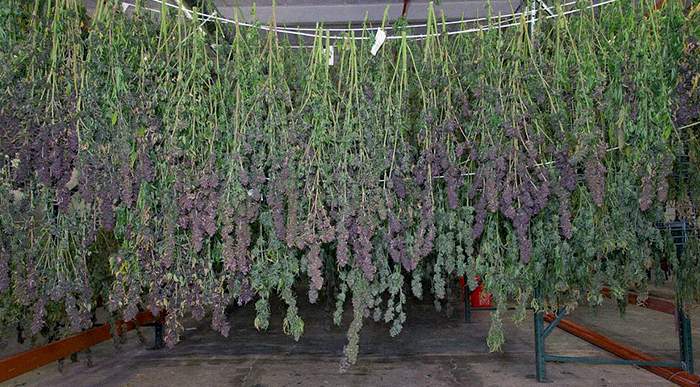Ever since Colorado decided to legalize the recreational sale and use of marijuana back in 2014, the state has become the epicenter of cannabis cultivation. With state-backed regulation and a booming tourism industry, an increasing number of companies and growers are deciding to try their hand in Colorado’s cannabis market. On top of that, big businesses have seen the immense profit that has been generated in the state’s medical and recreational markets, which has lead to larger-scale agricultural grows than ever before. Competition has increased exponentially, and as a result cannabis prices have dropped significantly.
Those who are small-scale growers in Colorado, such as Anthony Franciosi, the founder of Honest Marijuana, have still found a viable market for naturally grown high-grade bud. Although major cultivators like LivWell and Native Roots have higher volume commercial grows, they use processes that are generally automated. Franciosi, on the other hand, has found that his plant-based nutrients, organic inputs, and careful attentiveness has kept his operation profitable. Technically, Honest Marijuana's cannabis cannot be classified as “organic” as that is a federally regulated system, but Franciosi's primary focus is to keep as much of the grow process as natural as possible. Still, he recognizes the shift from a boutique market to an agricultural one. According to the longtime grower, a wholesale pound of high-grade cannabis could net you $2,500 last year, but now he sees premium product going for as low as $1,500.
“The real deal is the crazy increase in automation and the big agricultural mindset that has come into what was a 100 percent boutique industry,” Franciosi says. “In the beginning, you had regular people getting licenses in the medical program and carving their own growing niches. Now that big business has seen how it’s going, investment dollars have rolled into these facilities, and you see big names buying up smaller grows and storefronts.”
There are a number of factors that Franciosi thinks set small-scale grows like his own apart in this increasingly saturated market. “It’s still a boutique industry, but that’s rapidly changing,” he says. “The people who are ahead of that curve, and can distinguish themselves with their packaging, the preservation, and in the overall brand image, are the ones who are getting the bigger dollars. But there’s so much of that out there that it’s very hard to do, and I don’t think that’s going to change anytime soon.”
For many, the competitive market and lower prices have produced a need for more efficiency in cultivation, which in turn has led to more opportunities for supply chain solution providers. Mike Bologna, the co-founder of the cannabis business strategy firm Green Lion Partners, started the company Natural Order Supply to provide supply chain tools that would make grows more efficient. As cannabis cultivation becomes a more commercial and automated industry, it has become important to implement effective grow systems in order to optimize the product while still reaching the current low wholesale price.
To Bologna, the price drop is a response to the perceptive shift of cannabis as a taboo product to an agricultural product. “As more cultivators open operations, improve their quality and consistency, and penetrate already saturated markets, we continue to see a ‘race to the bottom’ for wholesale cost,” says Bologna. “It is my opinion that this is a market correction to a more sustainable price for what is, at its base, an agricultural product. From a standard supply-and-demand standpoint, this price is likely more representative of future cost than where it was a year ago.”
One major way that cannabis companies have remained profitable while prices have dropped is by playing the “jack of all trades” role. Denver-based dispensary Medicine Man has been able to thrive off of self-sufficiency, producing all of its own product in-house. This has helped it keep prices low and still thrive, while retail stores depending on wholesale have struggled to keep up.
Unlike Bologna, Andy Williams, the owner of Medicine Man, feels that prices will get back to the range that they were before in the next year or so. According to him, this rising competition has hurt a number of cultivators and wholesalers that depended on the previous recreational market standard. This means that supply is actually will eventually start going down, which will eventually impact retailers who are unable to produce or obtain cannabis in a cheap and efficient way.
“In the next year, around 4/20 or later, you’re going to see cannabis prices back up to the $1,800 to $2,000 pound range that they were before,” Williams says. “Because retail prices haven’t come down as fast as wholesale prices, all of these retailers that came in and are benefiting from these low cannabis prices are not going to be able to compete with people who are vertically integrated or producing more efficiently, in terms of cannabis production.”
Although the recreational market is flooded with low-priced cannabis, it’s important to note that the medical industry is lacking supply. In his dispensary, which offers a different menu for both markets, medical cannabis prices have been much more consistent, and remain unchanged in light of the lower recreational prices.
“They’re definitely separate,” Williams says. “Right now, there’s a shortage of supply on the medical side. I’m constantly getting calls from people searching for medical cannabis. Most cultivations have predominantly switched to the recreational market because it’s such a big market. The demand side is on the rec, although right now you can actually make better margins on medical product.”
Colorado’s cannabis industry is currently worth over $1 billion, but with that lucrative market comes fierce competition and an increase in supply. Though larger and more agricultural-minded companies have come in to produce at larger volume, experienced market veterans have been able to sustain their business with effectiveness and quality. At the end of the day, these cannabis companies are basically playing by the same rules of supply and demand as almost every other industry, and they must prepare themselves for that delicate balancing act.











